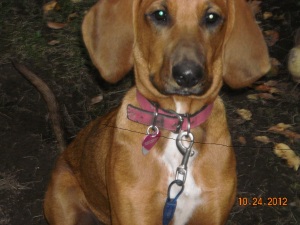
One summer day, when I was about eight years old, I was sitting under an elm tree watching a cricket match in the local recreation park. Then something plopped in front of me. It was a ball of fluff with short black feathers sticking out. I turned to my friend Sam.
“Look Sam, a baby bird fell out of its nest. I’m going to take it home.”
“You can’t have it, I saw it first,” he retorted.
“You didn’t know it was there until I told you! You can have the next interesting thing we find.”
“Okay. Nursing baby birds is too girly for me anyway.”
Unfortunately for Sam, the next thing we discovered was an unexploded German Butterfly bomb. Sam grabbed it eagerly. “I’m going to cut it open and get the powder out.”
I stayed as far away as possible, so I wasn’t there when Sam tried to dismantle the bomb. Apparently, he clamped it in a vice and attacked it with a hacksaw. When the bomb exploded, he was killed instantly, and his tool shed was demolished.
I carried the baby bird home in a paper cup.
My mother helped me make a nest for the bird by filling an old shoe box with worn-out socks. Then we used a clean ink filler to feed the bird by squirting milk into its open beak. The bird rapidly recovered from its trauma and had no serious injuries. After a couple of weeks we switched the diet to bird seed, which it ate without assistance. The bird was black, so we thought it was a rook—and we gave it the name “Rookie.” A few weeks later, we went to the aviary at Regents Park Zoo, where we compared all the black birds—rook, raven, crow, blackbird, magpie, etc. We found that Rookie was merely a common crow. But because rooks and crows are related subspecies, we figured the name was close enough. Also, of course, “Rookie” suggests a beginner, so it seemed appropriate.
We never intended to keep Rookie captive. As soon as he could flap his wings, we put him and his food outside. Soon he learned to fly and forage for food. But he still stayed close to the house. Then he reached maturity. We assumed he was male, because he didn’t lay eggs or build a nest. One day he wanted to find a mate, so he attempted to join a huge local flock of crows. But they figured he wasn’t a real crow, and chased him off. It suddenly made sense that a group of crows would be called a “murder.” However, researchers have found that crows are actually very social and caring creatures, and also among the smartest on the planet. They can count up to five, and they can recognize people’s faces.
After his rejection by the local murder of crows, Rookie seemed to understand he would have to spend the rest of his life in the human world. He no longer did much flying, and became cranky—perhaps because he knew he was never going to get laid. He developed some very human emotions. Local children started to taunt him–so he started to attack them and chase them away. However, Rookie also retained some annoying crow characteristics. He kept stealing shiny objects (such as people’s jewelry and coins) and stashed the loot on top of our tool shed. Also, he would peck holes in the silver foil on top of bottles of milk that had been delivered and left on our doorstep. Perhaps he had developed a taste for milk as a baby.
One day, Rookie disappeared. My parents said he had probably rejoined the flock. But I knew that was impossible, because he had already tried and failed. Later, I learned that my father had taken Rookie to the local chicken farm, and had him destroyed. I don’t know why he did that—he was probably afraid of being sued by the parents of the obnoxious children that Rookie chased away. But my father had lied to me and had killed Rookie–a sort of surrogate kid brother (I was an only child). And that wasn’t the first time my father killed a pet bird. A couple of years earlier, my mother took me to Wales for a few weeks in the summer (to get away from the bombing in London). When we returned, the pet canary had died because my stupid father had forgotten to feed it.

